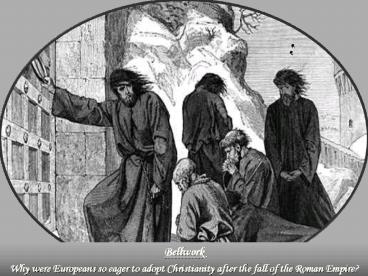Bellwork - PowerPoint PPT Presentation
1 / 16
Title:
Bellwork
Description:
Bellwork Why were Europeans so eager to adopt Christianity after the fall of the Roman Empire? Introduction to the Middle Ages (Chapter 9, section 1) Essential ... – PowerPoint PPT presentation
Number of Views:145
Avg rating:3.0/5.0
Title: Bellwork
1
- Bellwork
- Why were Europeans so eager to adopt Christianity
after the fall of the Roman Empire?
2
Introduction to the Middle Ages(Chapter 9,
section 1)
3
Essential Questions
- How did break down of Roman empire effect
creation of Germanic kingdoms in Europe? - What were the Germanic kingdoms of Europe like?
- What was the role of the church during this time?
4
When were the Middle Ages?
- Occurred from about 500-1500 A.D.
- Sometimes called Dark Ages.
- Signified emergence of European civilization.
- 4. Characterized by blended influences of
Germanic tribes, Roman legacy, and Christian
church.
5
Transforming the Roman World
- Read pages 302-303 and answer the following
questions for this section on your worksheet.
Baptism of Clovis
6
Transforming the Roman World
- Describe the Germanic people and what they did?
- -Occupied lands in Europe after Western Roman
Empire fell. - -Set up new states ruled by Germanic Kings.
Why were the Franks the most influential Germanic
people? -Clovis united several of the Germanic
Kingdoms under his rule. -Converted most people
under his rule to Christians.
Why do you think the Catholic church was so eager
to work with Clovis? -Powerful ally of Germanic
tribes. -Spread Christian beliefs.
7
Cloviss Frankish Kingdom.
8
Germanic Society
- Read page 304 and answer the following questions
for this section on your worksheet.
Trial by Ordeal
9
Germanic Society
- Why did the family unit become even more
important? - -No strong central government to establish laws
or be loyal to. - -Family was central to survival. No help from
government. - -Crimes were seen as being against the family,
not the state.
Compare Roman court system to the
Germanic? -Rome Studied evidence and demanded
proof. Crimes were against society, not
personal. - Germanic Crime against family causes
feuds. Avoided by paying wergild
(fine). -Germanic people used trial by ordeal.
Poison, hot oil, battle.
10
The Role of the Church
- Read pages 304-306 and answer the following
questions for this section on your worksheet.
Pope Gregory
11
The Role of the Church
- How did the chaos from the fall of the Western
Roman Empire help strengthen the Catholic
churches influence? - - System of Roman law and order broke down.
- -Church became strongest uniting power in
society. Helps all. - -No matter where you are every church run the
same, provides only sense of social stability.
Why were monks and nuns so important to medieval
society? -Took vow of poverty and chastity and
obedience to help others, set example. -Provided
shelter, food, medicine, education, etc. to the
community -Good deeds helped spread acceptance
of religion and sense of community.
Why do you think the vows they took were
necessary and were they effective? -Limit greed,
set example. -Pope still had tremendous power.
12
(No Transcript)
13
Layout of Medieval Churches
14
Carolingian Empire
- Read pages 306-307 and answer the following
questions for this section on your worksheet.
Charlemagne and his Scholars
15
Carolingian Empire
- What was the background of Charlemagne?
- -Fierce fighter
- -Christian, converted all people in lands he
captured. - -Seen as highly intelligent, valued learning.
May have been illiterate.
Why was his coronation as a Roman emperor so
significant? -Symbolized the joining of Roman,
Germanic, and Christian ideas. -Demonstrated
power of Pope in that he could name an emperor.
What were his most important legacies? - United
Western Europe for the first time since the
Romans -Created one empire and a central
Authority. -Created an intellectual renaissance.
Great works were copied and he promoted
learning.
16
(No Transcript)































